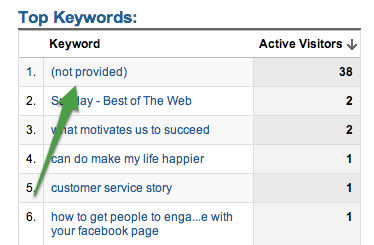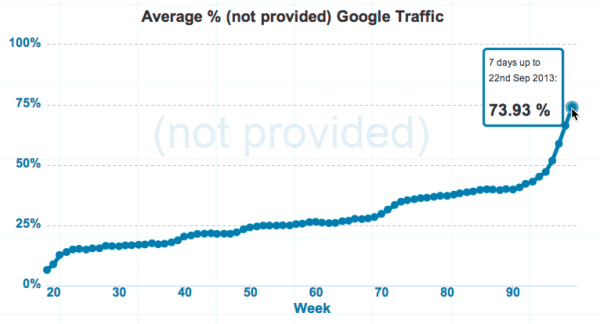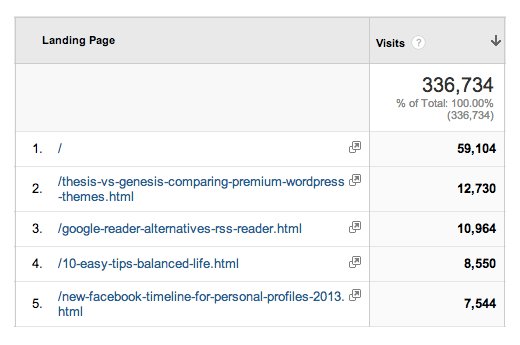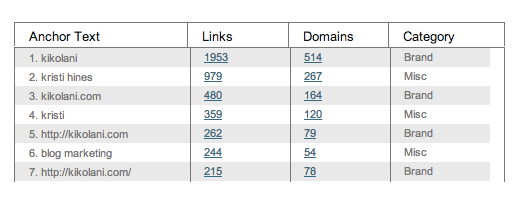
The internet went nuts a couple of days ago (or at least, the SEO world of it did) when Google confirmed that it would be encrypting almost all keyword searches in the near future. The Not provided Google Analytics section has easily become the most talked about thing in the past.
Various industry professionals weighed in on the change, what it means for marketers and what other options we have to inform our marketing choices.
Let’s take a look at what happened exactly, and then we’ll explore what kind of responses we’ve seen to the change so far.
Google confirms a change
After encrypting search terms from signed-in users in 2011, Google is now expanding that protection to all users. This means that marketers and website owners will see these keywords as simply “(not provided)” in their analytics.
Google didn’t make an official announcement to kick this off, but made the change quietly, only offering an explanation after being asked directly about it:
We added SSL encryption for our signed-in search users in 2011, as well as searches from the Chrome omnibox earlier this year. We’re now working to bring this extra protection to more users who are not signed in.
Search Engine Land reported that since July 2012, “not provided” keywords have been steadily increasing, as Firefox, Safari and Google Chrome have all started encrypting search terms, even for users who aren’t signed in to Google.
The real shock came in the last month, when the number of keyword terms listed as “not provided” spiked dramatically:

While Google did confirm that this will continue until pretty much all keyword terms are hidden, Google’s AdWords system does allow for keyword terms to be shown, still:
Publishers can still see these terms by going into the Google Webmaster Tools area, though they only see the top 2000 per day and only going back for 90 days (something Google said will increase to one year, in the future).
How the SEO world responded and the real impact on marketers
So let’s take a look at how the industry has responded to this change, and what kind of impact it will have on marketers and website owners.
Search Engine Land pointed out the possiblity that this could be a plan to create more advertising revenue for Google, since AdWords customers can view and save keyword data:
It’s an odd change to withhold search data from non-advertising publishers within the publishing support tool Google created for them but suddenly make them available in an alternative fashion through the ad system, one that suggest it’s all been part of a plan to create new Google advertisers.
Aaron Aders, the Co-Founder of digitalrelevance told HubSpot that this could be a good thing for digital marketing in general:
This move by Google will force SEO marketers to focus on business results rather than keywords – which is where the focus should be anyway.
Aaron’s point is that there are so many more important ways for marketers to be spending their time, like “lead generation, growing branded communities, and earning brand mentions,” instead of focusing solely on optimising for keyword searches.
Larry Kim, the Founder and CTO of WordStream, offered an alternative way of optomizing website content:
I’d argue that tracking organic content at a page level, rather than an individual keyword level, makes a lot more sense given the recent increases in keyword ranking volatility.
Larry also pointed out that other search engines are not following suit, so any keyword searches coming from Bing, Yahoo and others will give you some idea of the keywords that are most useful to you.
Lee Odden at TopRank blog wrote about some suggestions for content marketers, who might be used to relying on keyword terms for idea-generation, including using the keywords available to you if you’re an AdWords customers, and using a keyword research tool like Ubersuggest to get general ideas of search query syntax.
He also pointed out that monitoring social media can be useful for this purpose, and that any searches on your website’s internal search engine can provide ideas about the topics your customers are interested in.
Rand Fishkin, Founder and CEO of Moz, said that one of the biggest tolls this change will take is removing the ability for marketers to show the results of their efforts in improving search traffic (or at least making it a lot harder). Without proof that new search traffic is being generated, marketers will have a harder time defending their work.
What to do if you need those keywords
A couple of different marketers offered some suggestions of ways to find the keywords you need after this change takes full effect.
1. Track pages that target keywords
Kristi Hines pointed out at KISSmetrics that if you know which keywords you’re targeting with each page of your website, you can use that knowledge to your advantage.

By adding a search term for the source “google” to your Google Analytics reports, you can see exactly which pages are being sent traffic from Google, which can help you to work out which keywords are improving your organic search traffic.

2. Monitor anchor text
Another suggestion from Kristi’s post is to keep an eye on the anchor text that is sending traffic to your site. She suggests using a tool like cognitiveSEO that shows a list of the most popular text links that people are following to your site.

This can give you a good idea of what terms are naturally being linked to your site, which might inform the keywords you decide to target.
3. Run AdWords campaigns
Rand Fishkin explored some possible strategies in his Whiteboard Tuesday video on this topic, including paying attention to internal search terms, focusing on page-level search data, rather than keyword-specific data, and using keyword research tools to get broad ideas of keyword volume.
He also pointed out that running AdWords campaigns can be very beneficial in this situation. Although it points to the possibility of Google going against its “don’t be evil” ethos, it could be that Google’s plan is to increase AdWords revenue by removing the keyword data available to customers who don’t run ads.
Still, this is a valid option if you have the budget for ad campaigns, as you’ll receive much more useful data from your AdWords account.
Image credits: Not Provided Count, KISSmetrics
Try Buffer for free
190,000+ creators, small businesses, and marketers use Buffer to grow their audiences every month.

